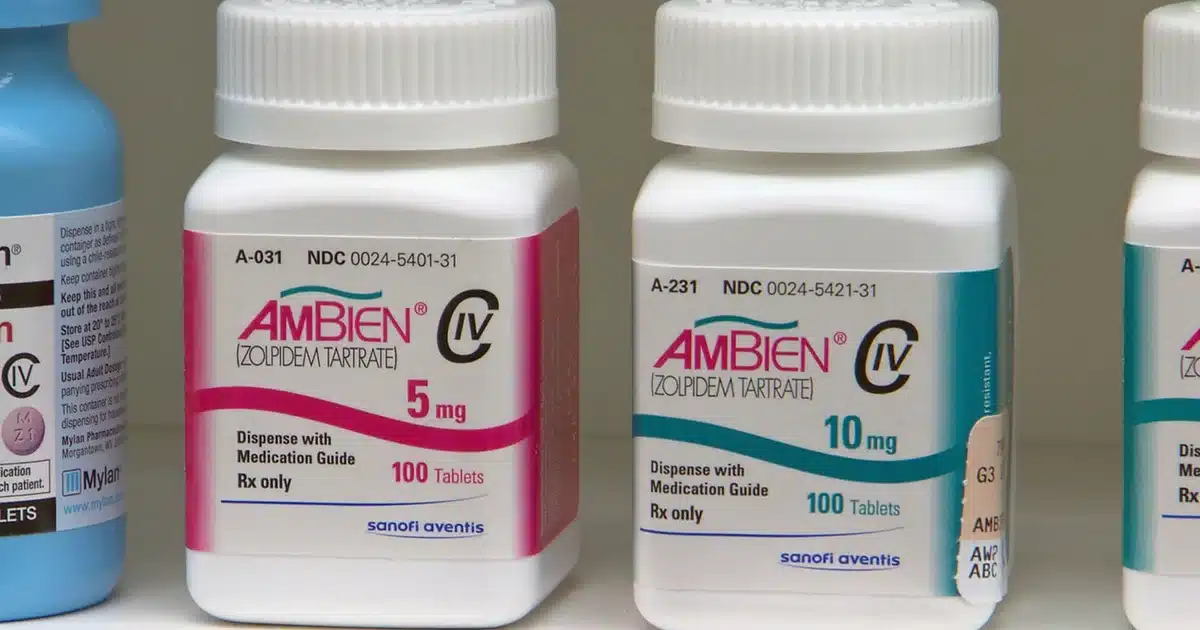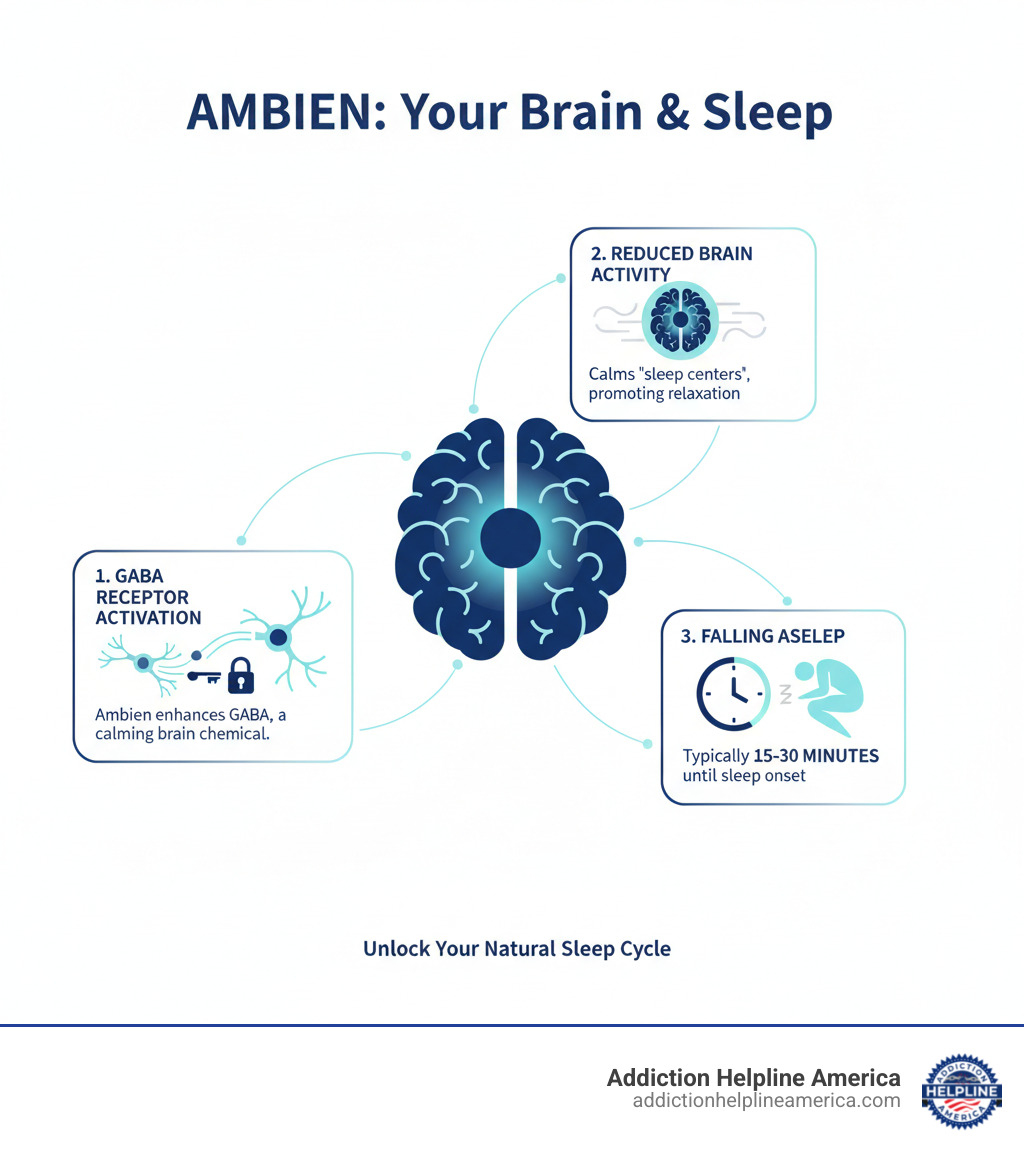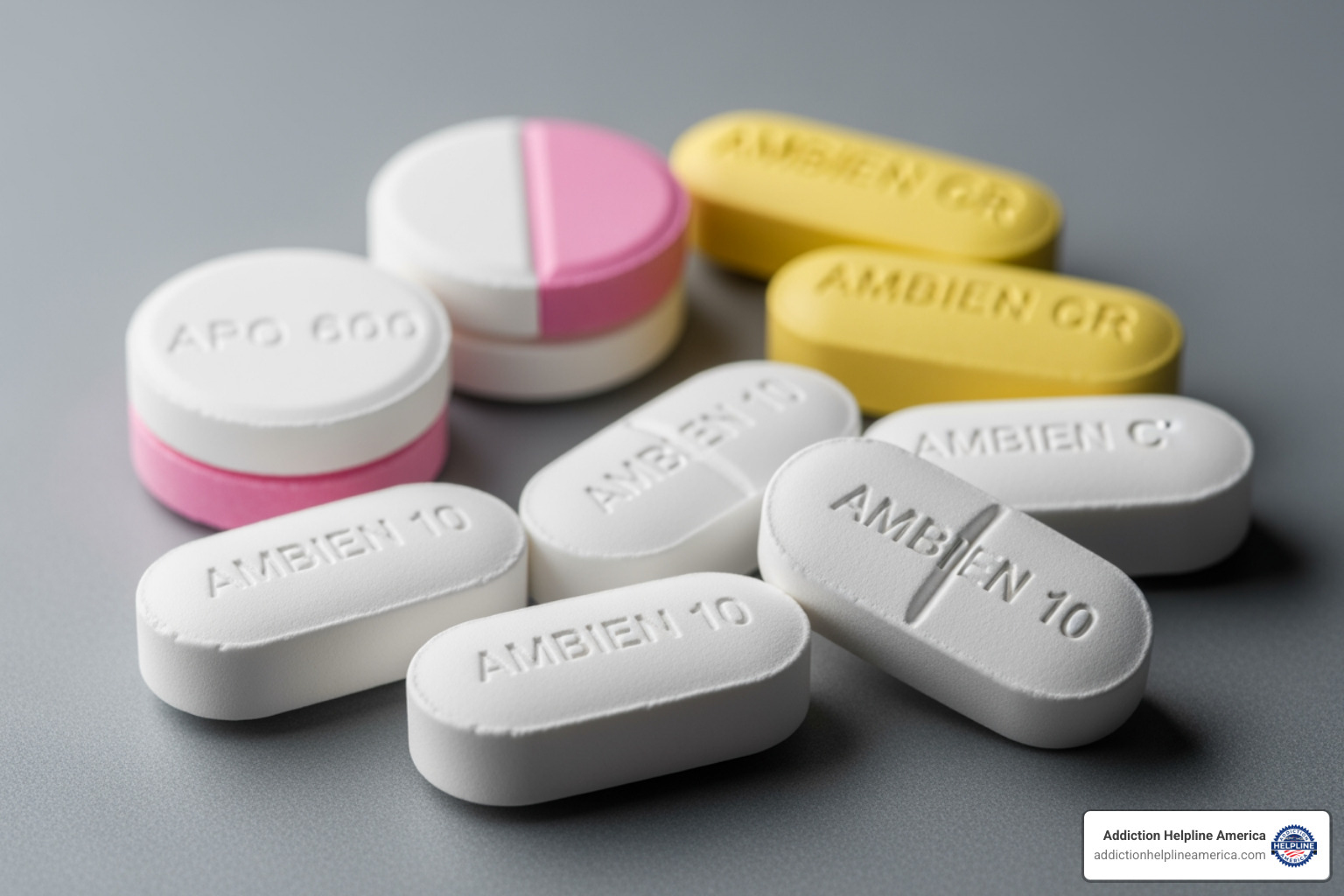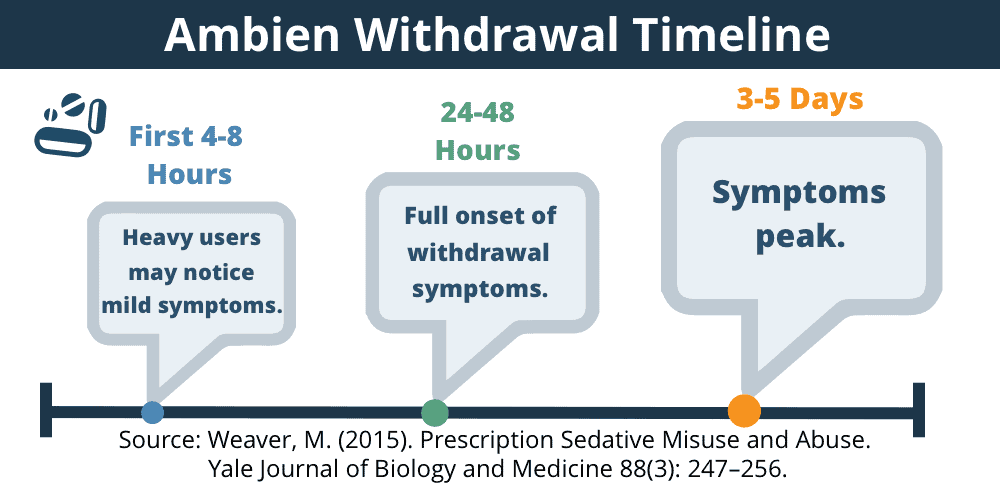
Understanding Ambien: What You Need to Know About This Sleep Medication
Ambien (generic name zolpidem) is a prescription sedative-hypnotic used for the short-term treatment of insomnia. It works by slowing brain activity to help you fall asleep faster.
Quick Facts About Ambien:
- Type: A non-benzodiazepine sedative-hypnotic (“Z-drug”)
- Use: Short-term insomnia treatment (1-2 weeks)
- Mechanism: Improves GABA activity in the brain to induce sleep
- Status: Schedule IV controlled substance due to dependence risk
- Warning: Can cause next-day drowsiness and complex sleep behaviors (e.g., sleep-driving)
While effective, Ambien carries significant risks, including dependence, addiction, withdrawal symptoms, and dangerous interactions with alcohol or other drugs. It is intended only for short-term use, as prolonged use increases the risk of serious side effects.
At Addiction Helpline America, we help people struggling with prescription medication misuse, including Ambien dependence. We offer confidential guidance and can connect you with treatment resources to manage sleep problems safely.

What is Ambien and How Does It Work?
Ambien (generic name zolpidem) is a non-benzodiazepine sedative-hypnotic, also known as a “Z-drug.” The FDA approved it for treating insomnia, particularly for people who have trouble falling asleep.
How Ambien Affects Your Brain
Ambien improves the effect of a natural brain chemical called GABA (gamma-aminobutyric acid), which acts as the brain’s “calm down” signal. By helping GABA slow down brain activity, Ambien makes you feel drowsy and helps you fall asleep.
Unlike older sleep aids like benzodiazepines, Ambien is more selective. It primarily targets the alpha-1 subunit of the GABA-A receptor, making it effective for sleep with fewer muscle-relaxant effects. For a deeper dive, see this scientific research on Zolpidem’s mechanism.
How Your Body Processes Ambien
Ambien is absorbed quickly, which is why it should be taken right before bed. It has a short half-life of about 2.5 hours, meaning your body eliminates half of the drug in that time. This helps reduce next-day grogginess, though some impairment can still occur.
Your liver metabolizes Ambien, mainly using the CYP3A4 enzyme. This is important because other medications can interfere with this enzyme, altering how your body processes Ambien and increasing the risk of drug interactions.
Uses Beyond Sleep
While primarily for insomnia, researchers have explored off-label uses for zolpidem. These include studies on its potential to help with certain neurological and movement disorders. There have also been case studies where it temporarily restored some function in patients with brain injuries and research into its effect on aphasia (language difficulties) after a stroke. These uses are not FDA-approved and require more research.
Call Now – Your Journey to Recovery Begins Today!

Take the first step towards a healthier life! Call now to connect with our compassionate team and start your recovery journey today. Your path to healing awaits!
Our recovery specialists are available 24/7 to provide support, and all calls are confidential and free. Reach out anytime – we’re here to help!
Proper Use and Dosage of Ambien
To use Ambien safely and effectively, it’s crucial to follow your doctor’s instructions. Small changes in how you take it can make a big difference.

- Timing is key: Take Ambien immediately before getting into bed, not before finishing other tasks. Its effects can be rapid.
- Plan for a full night’s sleep: Ensure you have at least 7 to 8 hours to sleep after taking the medication to avoid next-day grogginess and impairment.
- Take on an empty stomach: Food can slow down the absorption of Ambien, delaying its effects.
- Do not alter the tablets: Swallow extended-release tablets (Ambien CR) whole. Crushing, chewing, or breaking them can release the dose too quickly and cause dangerous side effects.
- Store properly: Keep Ambien in its original container at room temperature, away from heat and moisture, and out of reach of children.
- Dispose of safely: Use a medicine take-back program if available. Otherwise, mix the unused medication with an undesirable substance like coffee grounds, seal it in a bag, and throw it in the trash. Do not flush it unless instructed.
Different Forms and Dosages
Ambien is available in several forms:
- Immediate-release tablets (Ambien): Help you fall asleep quickly.
- Extended-release tablets (Ambien CR): A two-layer tablet to help you fall and stay asleep.
- Sublingual tablets (Edluar, Intermezzo): Dissolve under the tongue for fast absorption.
- Oral spray (Zolpimist): A rapid-acting spray.
Dosage is not one-size-fits-all. Women are typically prescribed a lower initial dose (5 mg) because they clear zolpidem from their bodies more slowly than men, increasing their risk of next-day impairment. Men usually start with 5 mg or 10 mg.
Special populations require extra caution:
- Older adults (65+): The recommended dose is 5 mg. They are more sensitive to Ambien’s effects, which increases the risk of confusion, dizziness, and falls. The American Geriatrics Society’s 2023 Beers Criteria lists zolpidem as potentially inappropriate for this group.
- Patients with liver problems: A lower dose of 5 mg is recommended for mild to moderate liver impairment. Ambien is generally not recommended for those with severe liver disease.
No one should exceed 10 mg of Ambien in one day. If your prescribed dose isn’t working, consult your doctor instead of increasing it yourself, as this can lead to dependence.
Understanding the Side Effects and Risks
Like any medication affecting the central nervous system, Ambien has both common side effects and serious risks.
Common side effects include next-day drowsiness, dizziness, diarrhea, and a “drugged feeling.” Headaches, mild nausea, or a dry mouth may also occur. While generally not dangerous, these effects can be uncomfortable.
The serious risks require careful attention. The most concerning is complex sleep behaviors, where individuals perform activities like driving, cooking, or making phone calls while not fully awake and have no memory of it later. These behaviors can lead to serious injury or death. The FDA has issued a boxed warning about this risk. If this occurs, stop taking Ambien and contact your doctor immediately.
Other serious risks include:
- Severe allergic reactions: Anaphylaxis or angioedema (swelling of the tongue or throat) can be life-threatening. Seek emergency medical help if you experience hives, difficulty breathing, or facial swelling.
- Worsening depression: Ambien can sometimes worsen depression or lead to suicidal thoughts. Report any changes in mood or behavior to your healthcare provider.
- Hallucinations: Though uncommon in adults (<1%), hallucinations have been reported, particularly in children.
- Next-day impairment: You may feel alert, but your coordination and judgment can still be impaired, making activities like driving dangerous. Allow at least 7-8 hours for sleep after taking Ambien.
Side effects can worsen with longer use, as shown below:
| Side Effect | Short-Term Use (up to 10 nights, Ambien 10mg) | Longer-Term Use (28-35 nights, Ambien 10mg) |
|---|---|---|
| Drowsiness | 2% | 8% |
| Dizziness | 1% | 5% |
| Diarrhea | 1% | 3% |
| Drugged feeling | Not specified | 3% |
| Headache | Not specified | 7% |
| Amnesia | 1% | 1% |
| Hallucinations | <1% | Not specified |
Precautions for Specific Populations
- Elderly patients: Are more sensitive to Ambien, leading to a higher risk of confusion, dizziness, and falls. The AGS Beers Criteria for older adults recommends caution due to these risks.
- Pregnant or breastfeeding women: Zolpidem crosses the placenta and can cause sedation or breathing problems in newborns. It also passes into breast milk in small amounts. Discuss the risks and benefits with your doctor.
- Children: Ambien is not recommended for anyone under 18 due to a lack of safety data and a higher risk of side effects like hallucinations.
Potential Drug and Alcohol Interactions with Ambien
Combining Ambien with other substances can be extremely dangerous.
- Alcohol: Never mix alcohol and Ambien. The combination greatly increases impairment, confusion, and the risk of complex sleep behaviors.
- Other CNS depressants: Combining Ambien with opioids, benzodiazepines, other sleep aids, or muscle relaxants can lead to severe sedation, respiratory depression, coma, and death. The FDA has issued a strong FDA warning on combining with opioids.
- Other medications: Drugs that inhibit the liver enzyme CYP3A4 (like ketoconazole) can increase Ambien levels and side effects. Drugs that induce it (like rifampin or St. John’s Wort) can make Ambien less effective.
Always inform your doctor and pharmacist of all medications and supplements you are taking.
Overdose, Dependence, and Withdrawal from Ambien
Ambien is a Schedule IV controlled substance, meaning it has a recognized medical use but also a potential for abuse and dependence. Understanding these risks is crucial for safe use.

Long-term use can lead to tolerance, where the original dose no longer works, tempting users to take more. This dose escalation significantly increases the risk of dependence.
Call Now – Your Journey to Recovery Begins Today!

Take the first step towards a healthier life! Call now to connect with our compassionate team and start your recovery journey today. Your path to healing awaits!
Our recovery specialists are available 24/7 to provide support, and all calls are confidential and free. Reach out anytime – we’re here to help!
Signs of Ambien Overdose
An Ambien overdose is a medical emergency, especially when combined with alcohol or opioids. Symptoms range from extreme sleepiness to coma. Key warning signs include:
- Dangerously slow or shallow breathing (respiratory depression)
- Severe confusion or light-headedness
- Fainting or loss of consciousness
- Inability to be awakened
If you suspect an overdose, call 911 immediately. You can also contact the poison control helpline at 1-800-222-1222. In a hospital, treatment may include supportive care and the use of an antidote called flumazenil, though it carries its own risks.
Dependence and Withdrawal
Physical dependence can develop even when taking Ambien as prescribed. When the medication is stopped abruptly, withdrawal symptoms can occur. These may include:
- Rebound insomnia (worsened sleep problems)
- Anxiety, restlessness, or panic attacks
- Stomach and muscle cramps, vomiting, or sweating
- Shakiness or tremors
In severe cases, withdrawal can cause hallucinations, delirium, or seizures. For this reason, you should never stop taking Ambien cold turkey after regular use. A doctor can help you create a safe tapering schedule to gradually reduce your dose, minimizing withdrawal symptoms.
At Addiction Helpline America, we understand the challenges of Ambien dependence. We provide confidential support and can connect you with specialized treatment. For more information, visit our guide on drug detox treatment centers. You don’t have to face this alone.
Frequently Asked Questions about Ambien
Here are answers to some of the most common questions about Ambien.
How long can you take Ambien?
Ambien is intended for short-term use only, typically for 1 to 2 weeks. Using it for longer than 4 to 5 weeks requires a medical re-evaluation. Persistent insomnia may signal an underlying issue that needs a different treatment. Long-term use significantly increases the risk of tolerance and dependence.
Can you cut an Ambien tablet in half?
It depends on the type. Immediate-release Ambien tablets that are scored (have a line down the middle) can often be split, but you should always confirm with your pharmacist. However, you must never crush, chew, or split extended-release tablets (Ambien CR). Doing so destroys the time-release mechanism and can lead to a dangerous overdose of the medication.
What happens if you take Ambien and stay awake?
Fighting the sedative effects of Ambien can lead to dangerous and bizarre side effects. Instead of falling asleep, you may experience:
- Amnesia: Performing complex actions and having no memory of them later.
- Hallucinations: Seeing or hearing things that aren’t there, which can be disorienting.
- Impaired judgment: Making poor or unsafe decisions.
- Complex sleep behaviors: The most serious risk, which includes activities like sleep-driving, cooking, or making phone calls while not fully conscious.
These paradoxical reactions are why it is critical to take Ambien only when you are in bed and ready for a full 7-8 hours of sleep.
Call Now – Your Journey to Recovery Begins Today!

Take the first step towards a healthier life! Call now to connect with our compassionate team and start your recovery journey today. Your path to healing awaits!
Our recovery specialists are available 24/7 to provide support, and all calls are confidential and free. Reach out anytime – we’re here to help!
Conclusion
Ambien (zolpidem) can be an effective short-term solution for insomnia, helping you get much-needed rest by calming brain activity. However, it is a powerful medication that demands careful and responsible use.
Remember these key points:
- Ambien is for short-term use (1-2 weeks) under medical supervision.
- It carries serious risks, including complex sleep behaviors, next-day impairment, and dependence.
- Never mix Ambien with alcohol or other CNS depressants like opioids.
- Do not adjust your dose or stop taking it abruptly without consulting your doctor.
If you find yourself relying on Ambien long-term or are concerned about your use, it’s time to seek help. Needing support is a sign of strength.
At Addiction Helpline America, we provide free, confidential support for those facing prescription medication dependence. Our team can connect you with treatment options custom to your needs.
If you’re concerned about Ambien dependence, we are here to help. Find personalized guidance for Ambien addiction treatment and take the first step toward recovery today.
Our helpline is 100%
free & confidential
If you or someone you care about is struggling with drug or alcohol addiction, we can help you explore your recovery options. Don’t face this challenge alone—seek support from us.
Programs
Resources
Will my insurance
cover addiction
treatment?
We're ready to help
Find the best
drug or alcohol treatment
center
Are you or a loved one struggling with addiction? Call today to speak to a treatment expert.















